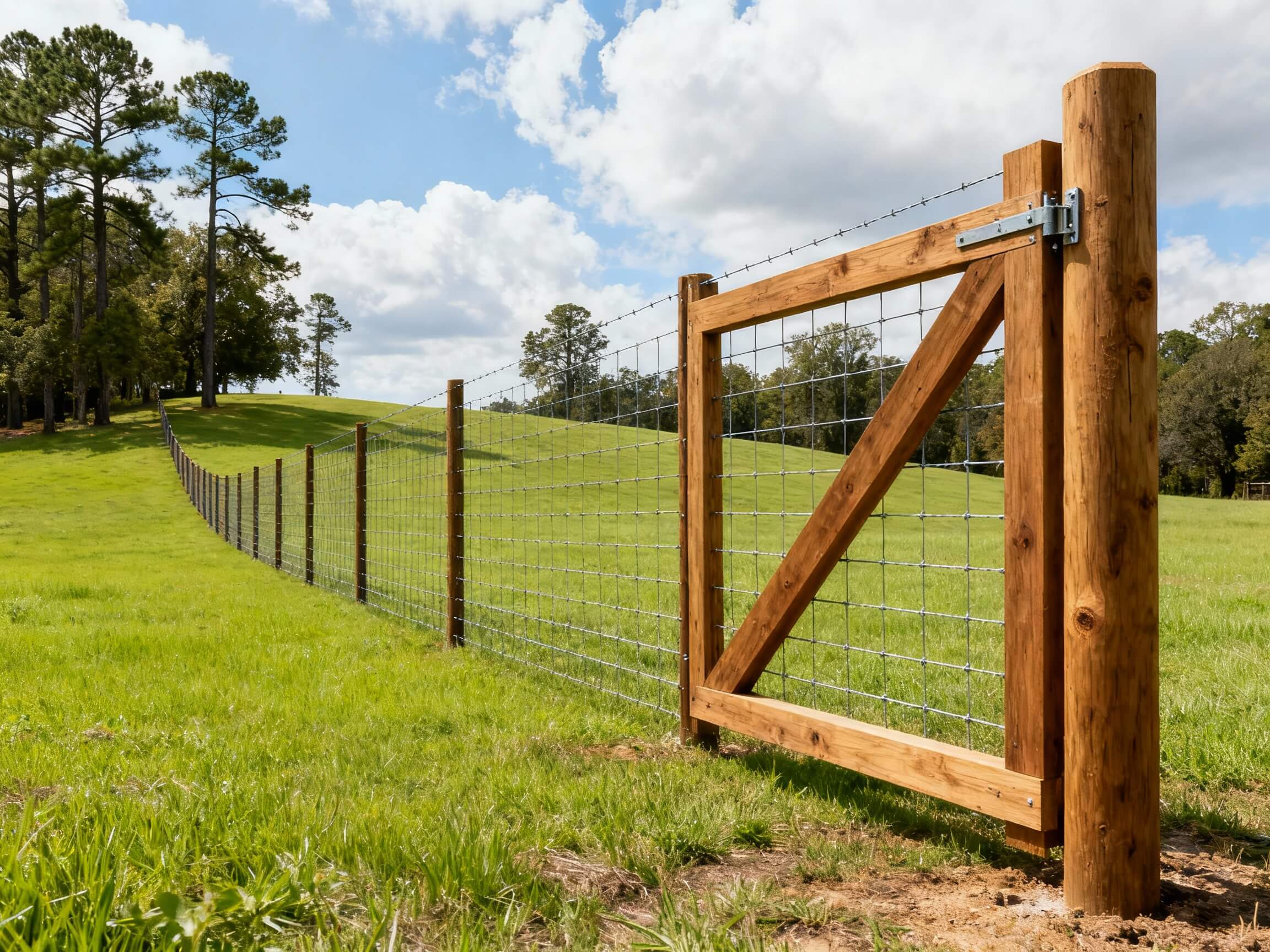
Stock Fencing Guide: Choosing the Best for Southeast Farms
A Complete Guide to Stock Fencing for a Southeastern Farm
Choosing the right stock fence is one of the most critical decisions for any livestock operation (quality wire coating tips). A well-built fence protects your animals, secures your property, and supports your farm’s efficiency. For farmers in the Florida Panhandle, South Alabama, and South Georgia, selecting the right materials and installation method is even more crucial to combat our unique climate of high humidity, coastal salt air, and intense storms.
This guide will walk you through the essential factors for choosing the perfect stock fencing, from matching materials to your specific animals to planning a long-lasting installation. By making an informed decision, you invest in a fence that provides security and value for decades.
Why the Right Fence Matters for Your Livestock in the Southeast
In our region, a fence is more than just a boundary line; it's a vital piece of farm infrastructure. It must be strong enough to contain your animals, durable enough to withstand the weather, and compliant with local regulations.
Matching Fencing to Your Livestock Type
Different animals have different fencing needs. A fence that works for cattle may not be safe or effective for goats or horses. The right livestock fencing is designed to contain your specific animals safely and humanely.
- Cattle: Docile cattle can often be contained with barbed wire or high-tensile wire. However, for operations near busier roads or with more aggressive bulls in places like Marianna, FL, a stronger high-tensile woven wire fence is a much safer investment.
- Horses: Barbed wire is extremely dangerous for horses and should be avoided. The best options are "no-climb" woven wire with a sight board on top or smooth board fencing, which prevents hooves and legs from getting caught.
- Goats and Sheep: Known as escape artists, goats require tightly woven wire with small 4-inch square openings Bomann Fencing, 2025. This design prevents them from pushing their heads through or climbing the fence, a common challenge for homesteaders from Andalusia, AL, to Tifton, GA.
Battling Humidity, Salt, and Storms
The Southeastern climate is tough on fences. Constant humidity, corrosive salt air along the coast from Mobile, AL, to Panama City, FL, and the threat of hurricanes demand materials built for longevity. Without the right protection, rust and rot can compromise your fence in just a few years.
To ensure your fence lasts, look for wire with a Class 3 galvanized coating, which provides excellent rust resistance for 20 years or more. For properties near the coast, an even more advanced Bezinal® coating offers superior protection against salt-air corrosion, making it a wise investment for coastal ranches.
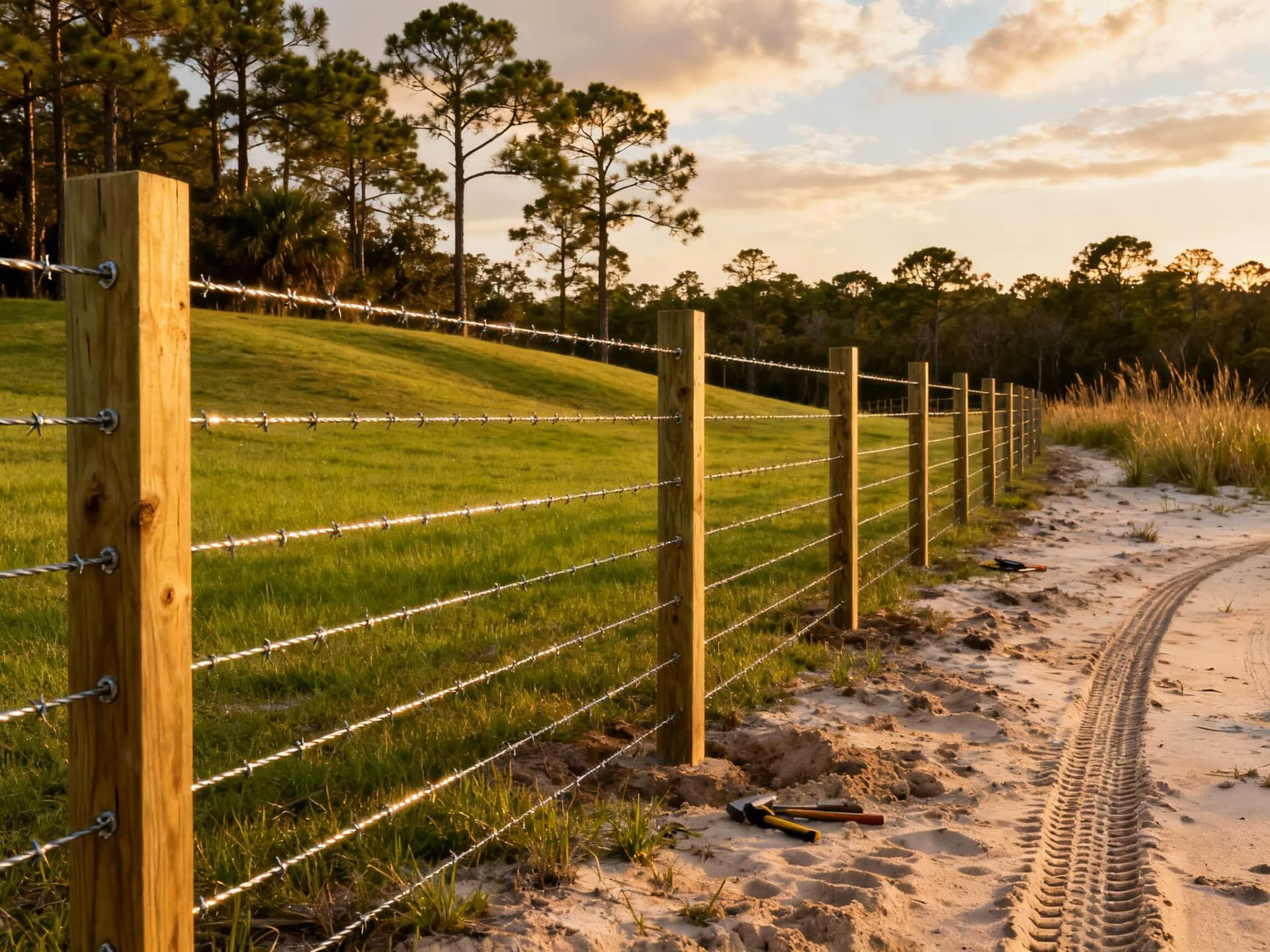
The Legal Responsibility of Animal Fencing
In Florida, Alabama, and Georgia, property owners have a legal duty to keep their livestock securely contained Southern Ag Today, 2025. If an animal gets loose and causes damage or an accident, the owner can be held liable. Investing in a properly installed, high-quality animal fencing system is not just good farm management—it’s a crucial step in protecting yourself and your community.
A secure perimeter fence ensures your animals stay safe on your property and prevents them from wandering onto roads or neighboring land, providing peace of mind for operators across rural communities like Quincy, FL, and Thomasville, GA.
Comparing Top Stock Fencing Materials for Durability and Cost
Three primary materials dominate the agricultural fencing market in our region: high-tensile wire, woven wire, and barbed wire. Each offers a unique balance of strength, safety, and cost, making them suitable for different applications.
High-Tensile Wire: The Modern Standard for Strength
High-tensile stock fence wire is the top choice for modern, large-scale livestock operations. Engineered for extreme durability, it can last 20 to 40 years with minimal maintenance. Although the upfront cost can be higher than barbed wire, its incredible strength allows for wider post spacing, reducing material and labor needs.
The long-term savings on repairs make it a cost-effective investment for containing large herds across the expansive pastures found near Gainesville, FL, and Auburn, AL. Properly tensioned, it serves as a powerful physical and psychological barrier for cattle.
Woven Wire (Field Fence): The Safer, More Versatile Choice
Woven wire, also known as field fence, is an incredibly strong and versatile option. Its mesh design prevents animals from pushing through, making it ideal for containing mixed livestock, including smaller animals like goats and sheep. It's also much safer than barbed wire for horses, especially no-climb designs with 2-inch by 4-inch openings that prevent hooves from getting stuck.
Woven wire performs exceptionally well on the rolling hills and uneven terrain common in South Georgia. With different knot types available, like the S-knot or fixed-knot, you can choose the perfect design for your specific needs.
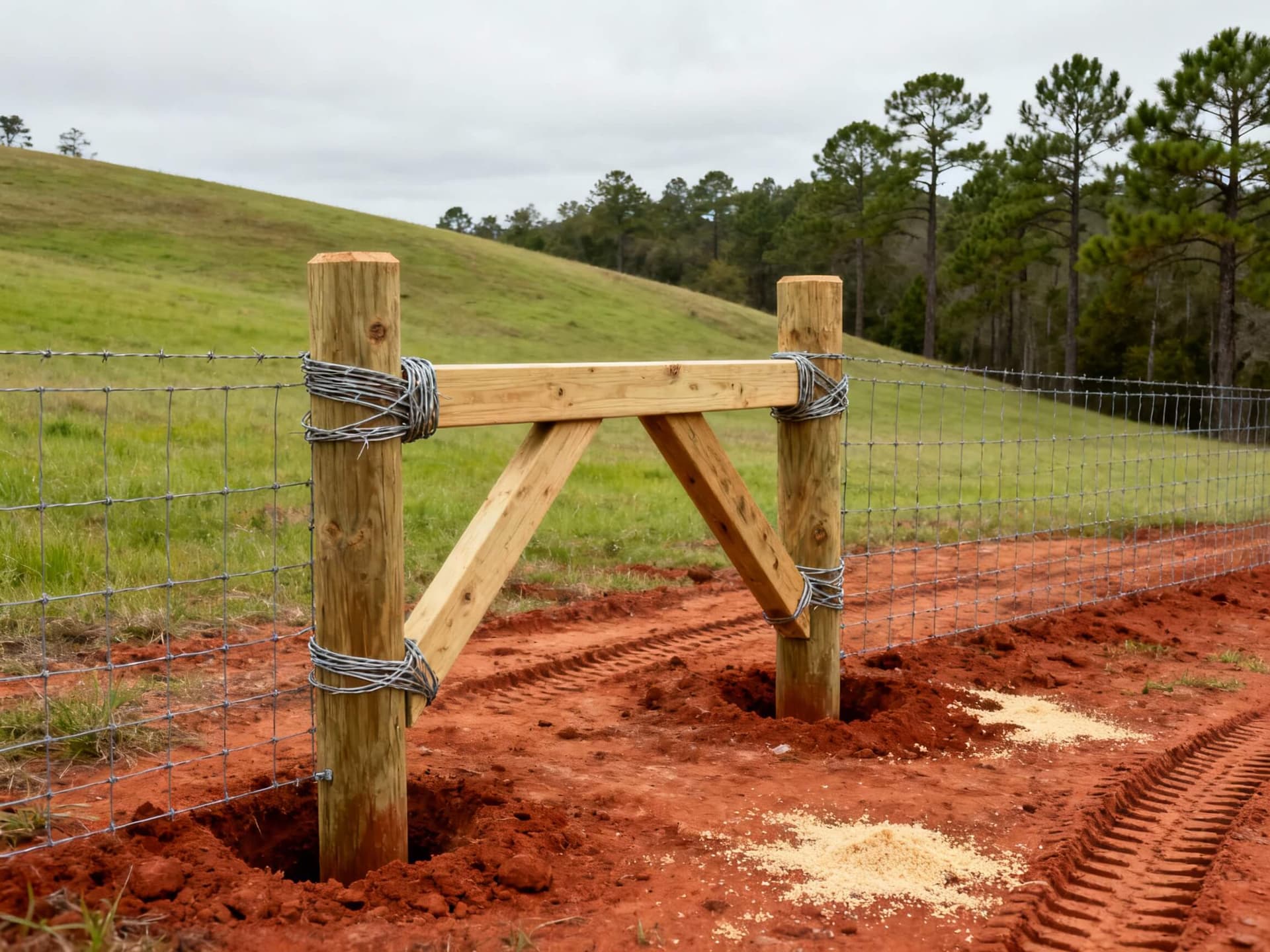
Barbed Wire: The Economical Option for Large Acreage
For decades, barbed wire has been the go-to solution for fencing large tracts of land on a budget. It remains the most economical option for defining property lines and containing cattle across vast acreages. Its low material cost makes it a practical choice for ranchers in areas like Chipley, FL, who need to cover hundreds or thousands of acres.
While effective for cattle, it's not recommended for horses, goats, or other animals prone to injury. Its main purpose is to establish a clear boundary and create a psychological deterrent for docile livestock.
Planning for Installation and Long-Term Value
Even the best fencing materials will fail if not installed correctly. Professional installation ensures your fence is built to withstand decades of livestock pressure and harsh weather, giving you the best return on your investment.
The Critical Role of Posts, Bracing, and Professional Installation
The foundation of any great fence is what holds it up. Deep-set wood posts, treated to a .60 CCA level for maximum rot resistance, provide a solid anchor in our region's damp soil. Equally important are the corner and end assemblies, where fence lines are put under the most strain.
Robust H-braces are essential to maintaining proper wire tension and preventing sagging over time. An experienced installer will use specialized equipment to drive posts deep and ensure every component is properly tensioned, creating a structure that can handle pressure from livestock and the elements for years to come.
Budgeting Your Fence: A Look at Costs per Foot
Fence installation costs vary based on materials, terrain, and project size. As of 2025, you can expect the following installed price ranges HomeAdvisor, 2025:
- Barbed Wire: $1.25 to $6.00 per linear foot.
- Woven Wire: $1.50 to $6.00 per linear foot.
- High-Tensile Wire: $2.50 to $7.50 per linear foot for woven high-tensile systems.
Farmers in Alabama have a unique advantage: a state sales tax exemption on fencing materials used for livestock, which can significantly reduce the overall cost of a new fence in cities like Dothan and Enterprise.
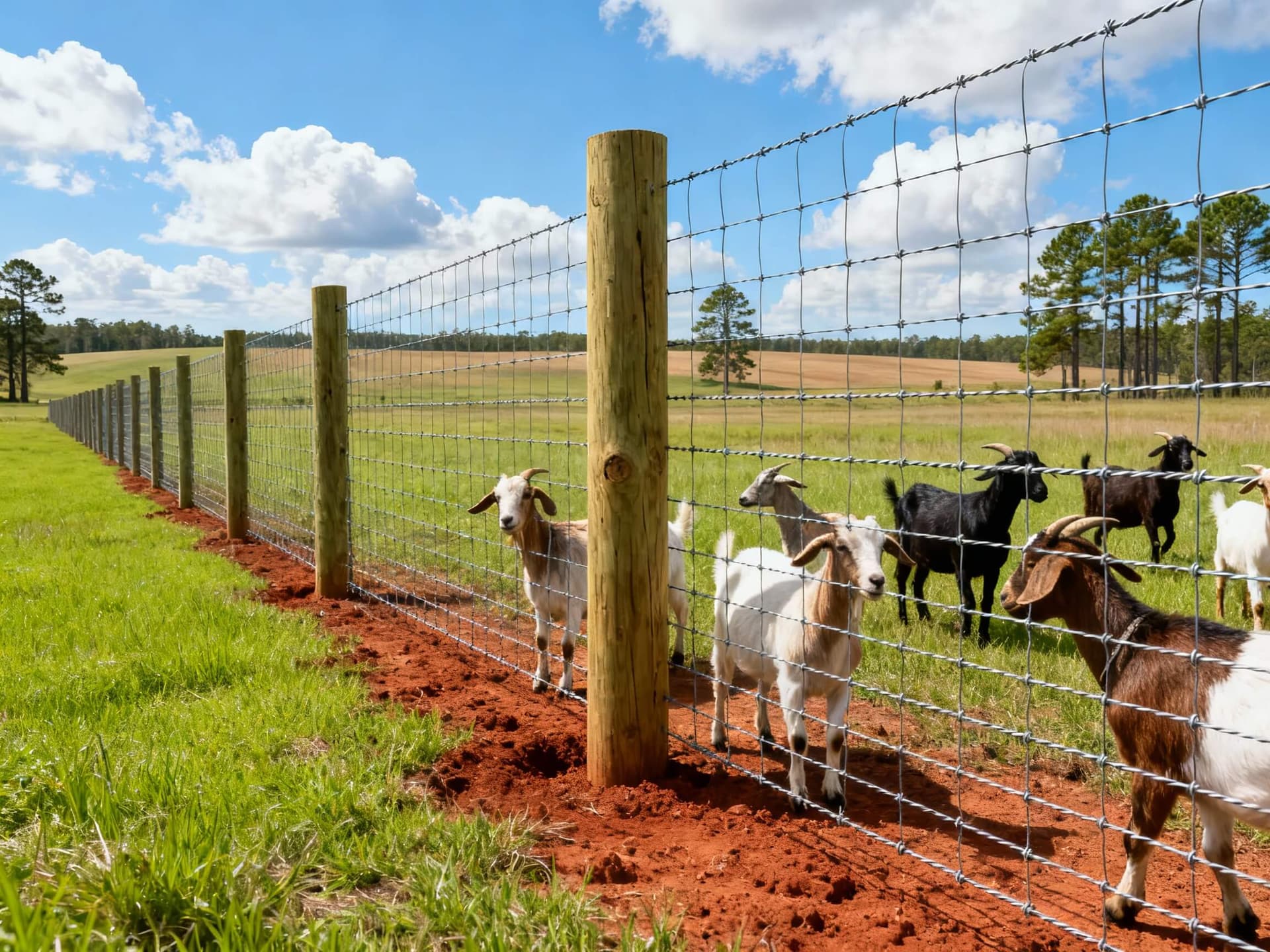
Enhancing Containment with Electric Fencing
Electric fencing is a powerful tool to enhance the effectiveness of your primary fence. A single electrified strand added to the top of a woven wire or high-tensile fence can train animals to stay away, reducing pressure and wear on the physical barrier. It's especially useful for implementing rotational grazing systems, a popular practice on modern farms from Pensacola, FL, to Montgomery, AL.
While not typically used as a standalone physical barrier, an electric wire adds an effective psychological deterrent that improves containment and extends the life of your stock fencing.
Frequently Asked Questions About Stock Fencing
What is the most durable type of stock fencing for the Florida climate?
For Florida's humid and often salty climate, high-tensile wire with a Class 3 galvanized or premium Bezinal® coating is the most durable option. This type of stock fencing offers superior resistance to rust and corrosion, and can be expected to last for 20-40 years.
What is the best stock fence wire for cattle?
A 12.5-gauge high-tensile wire is the industry standard for cattle stock fencing due to its excellent combination of strength, longevity, and visibility. For extra security, especially in feedlots or along busy roads, a high-tensile woven wire design is also a top-tier choice.
How much does livestock fencing cost per acre in Alabama?
The cost to fence one acre in Alabama can range from around $3,500 for basic barbed wire to over $7,000 for higher-end livestock fencing systems. However, Alabama farmers should remember to take advantage of the state sales tax exemption on fencing materials to help lower this total cost.
Can you use barbed wire for horses?
No, it is strongly recommended that you avoid using barbed wire for horses. Their skin is easily torn, and they risk serious injury if they panic and become entangled in the barbs. Safer alternatives include woven wire no-climb fences, board fencing, or high-visibility electric tape fences.
The best stock fencing is a long-term investment in your farm’s safety, security, and efficiency. While high-tensile wire offers unmatched durability for cattle operations, woven wire provides superior safety and versatility for a variety of animals. No matter which material you choose, professional installation with high-quality posts and bracing is non-negotiable for a fence that will last for decades.
Protect your investment and your livestock with a fence built right the first time. For expert agricultural fencing services across the Florida Panhandle, South Alabama, and South Georgia, contact Bomann Fencing today for a comprehensive estimate.
Share this article
Related Posts
Need Help?
Get expert fencing advice and free quotes. Our team is ready to help with your project.
Available Mon-Fri, 8am-6pm EST
Related Posts
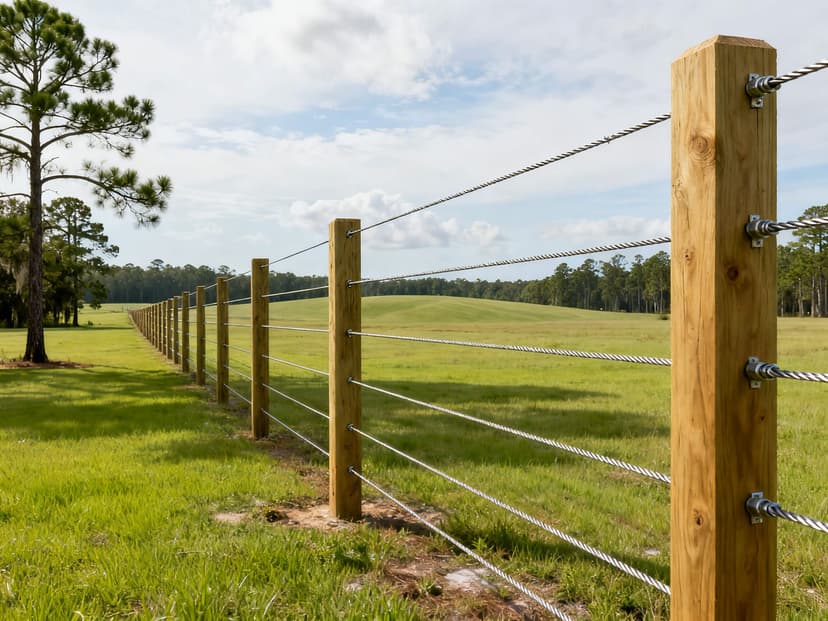
Cable Fence for Cattle: The SE Rancher's Durable Choice
Why Choose a Cable Fence System for Your SE Ranch? You need a strong, reliable fence to contain your cattle across large...
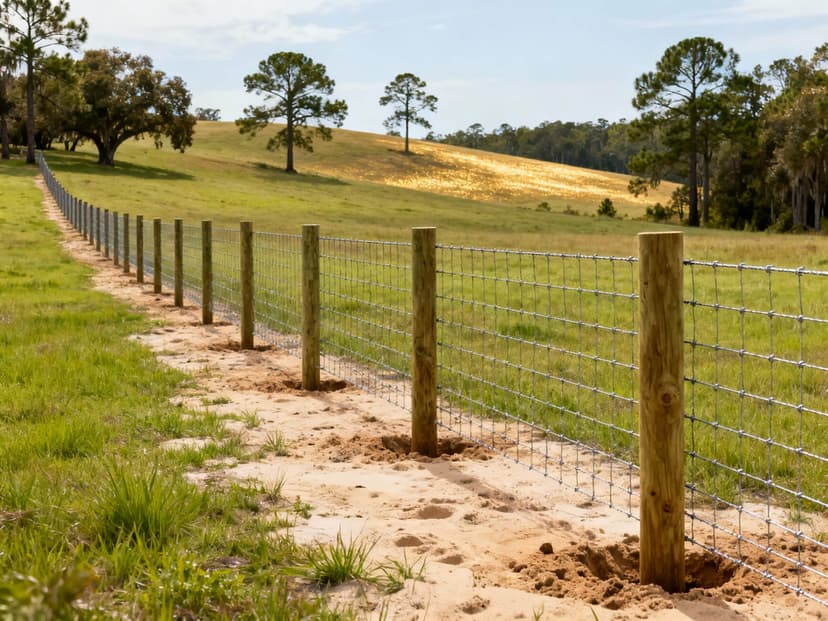
Cattle Fence Roll: The Complete Guide for Southeast Farms
Understanding Your Cattle Fence Roll Options When fencing a large operation, the type of wire you choose is a decision t...
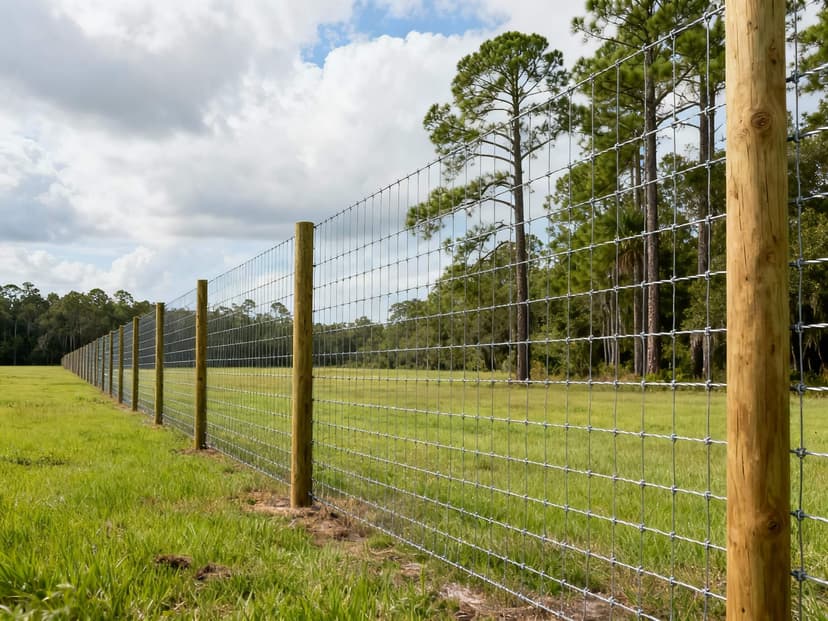
6 Proven Applications for a 6 Foot Field Fence
6 Proven Applications for a 6 Foot Field Fence As a farmer or rancher in the Southeast, you need a fencing solution that...
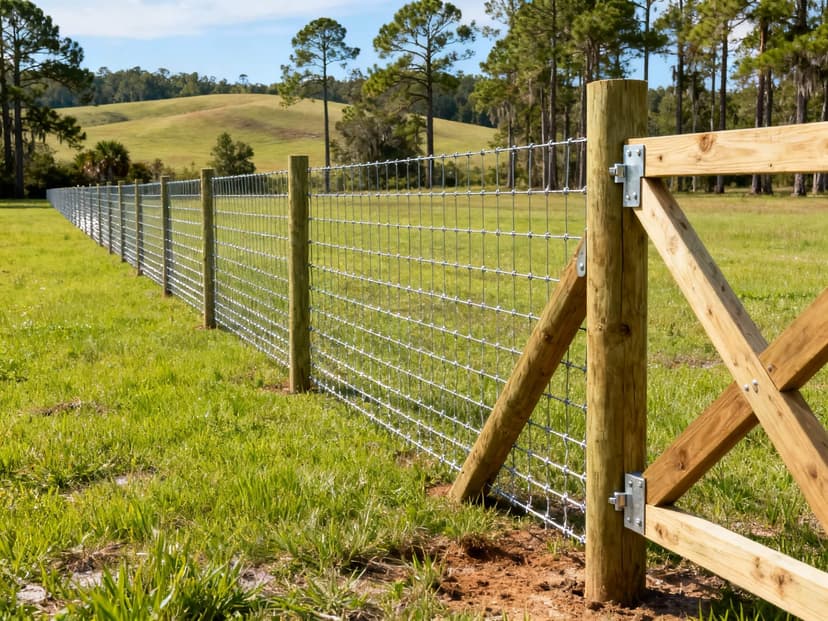
4 ft Field Fence: A Farmer's Guide to Cost & Setup
A Complete Guide to 4 ft Field Fence for Your Modern Farm For farmers and ranchers across the Florida Panhandle, South A...
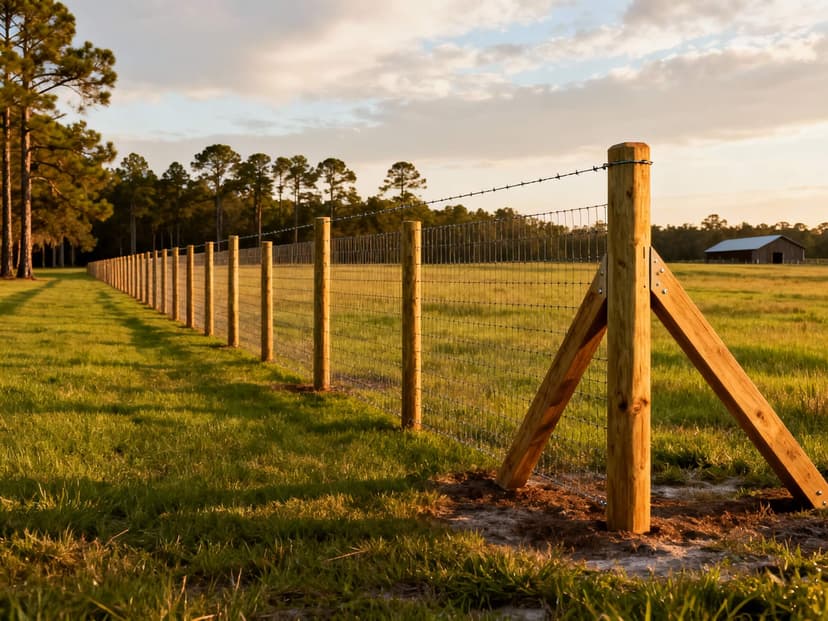
Livestock Wire Fence: A Pro's Guide for the Southeast
Planning and Material Selection for the Southeast A durable livestock wire fence starts long before the first post is dr...






